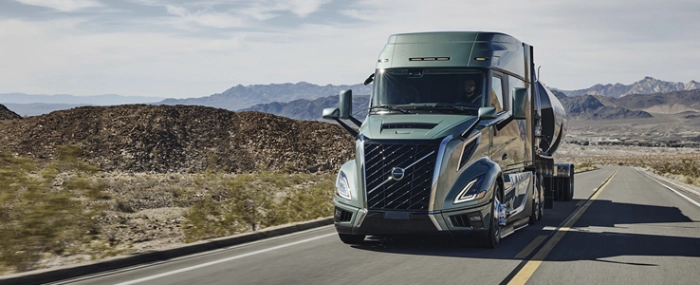
Volvo raising the bar for electric trucks
Amid a mood of cautious optimism, the launch of Volvo’s new FH Electric truck in 2025 is set to mark a milestone in the Swedish giant’s development with the market in need of a timely boost.
Author: Geoff Mortimore
With a range of up to 600 kilometers on a single charge, Volvo’s new long-range version of its FH Electric truck marks not only a technological breakthrough, but also a significant step towards the company’s sustainability goals – addressing two critical challenges for the industry.
“The largest share of trucks going forward will be battery electric,” says Lars Mårtensson, Environment and Innovation Director at Volvo Trucks, in the interview with Geoff Mortimore for Evertiq. “We believe the new FH Electric will play a crucial role in this transformation.”
A market in transition
The global market for electric trucks was valued at *$19.5 billion in 2023, and is expected to grow at a CAGR of 14.5%, reaching $78 billion by 2033. Rising demand for eco-friendly logistics solutions, coupled with regulatory and technological advances, has positioned electric trucks as key players in this transformation.
Volvo Trucks is already leading the charge, with total global deliveries of 1,977 electric trucks during 2023, an increase of 256 percent compared to the previous year. The company accounts now for some 49% of the market share in Europe and 40% in North America. With some 4,600 battery-electric trucks operating in 49 countries, Volvo is setting the benchmark for electric freight.
The company expanded its electric range in 2024 with two new models – the Volvo FH Aero Electric and Volvo FM Low Entry, bringing its total electric truck offerings to eight, with the upcoming long-range version of the FH Electric poised to further penetrate the market.
“We’ve been selling electric trucks for over five years now,” says Mårtensson. “We can cater to many transport assignments, including waste management, distribution, construction and regional haul and our early entry has given us valuable experience, enabling us to deliver excellent solutions to our customers.”
Set to debut in late 2025, the new long-range version of the FH Electric is designed for interregional and long-distance routes. Powered by Volvo’s e-axle driveline technology, it offers significantly more onboard battery capacity. Improved battery and driveline efficiency together with further optimization of management systems extend its range to 600 km, reducing the need for frequent recharges.
Technological, operational and regulatory benefits
With advancements in battery technology continuing to reshape the landscape, electric trucks may be capable of handling long-haul routes seamlessly in the near future, while autonomous electric trucks could revolutionize freight transport by lowering labor costs and improving efficiency.
A key factor in their favor is that electric trucks offer substantial operational cost advantages. With fewer moving parts, they require less maintenance, and electricity often costs less than diesel, particularly in parts of Europe. These factors contribute to an improved total cost of ownership, making electric trucks increasingly viable for logistics companies.
Government incentives, including subsidies and tax benefits should further encourage fleet operators to adopt electric vehicles, although challenges do persist in battery technology, infrastructure, and initial investment costs.
Overcoming Challenges
Volvo is addressing the battery issue with investments in dedicated production facilities. Its Ghent plant, opened in 2022, assembles battery packs tailored for heavy-duty electric trucks, while a new facility in Mariestad, Sweden is also under development. However, the company announced in September that it would delay the proposed construction start of the plant by 12-24 months, saying that the aim is to time the ramp-up of production with the demand of battery-electric applications to avoid building up a much larger operation than the market
“The technology is evolving,” Mårtensson explains in the conversation with Geoff for Evertiq. “Energy capacity and costs are improving, but supply chain challenges for critical materials and the carbon footprint of batteries remain hurdles.”
Charging infrastructure also poses a challenge, with many regions lacking adequate charging stations, particularly along major freight routes. Volvo Trucks President Roger Alm has regularly highlighted the need for cross-sector collaboration and investments in energy grids to support the transition.
The high initial cost of electric trucks, largely due to battery expenses, is another barrier. Smaller companies in particular, face financial constraints, even as regulatory pressures mount. Recent shifts, such as Germany withdrawing subsidies and potential threats following the election of Donald Trump, have added further uncertainty.
A Multi-Path Strategy
Recognizing that no single technology can address all challenges, Volvo is pursuing a three-path truck-powered strategy: battery-electric, hydrogen fuel cell electric, and renewable fuel-powered combustion engines.
“The market will evolve segment by segment, region by region,” says Johan Larsson, VP of Electromobility Business Development at Volvo. “Grid access, green electricity, energy pricing, and charging infrastructure will all influence the pace of adoption.”
And recently, economic factors, including inflation and rising interest rates, have also slowed the electric truck market. Larsson believes that improving the total cost of ownership, implementing CO2 pricing, and investing in public charging infrastructure are critical to accelerating growth.
The Road Ahead
Despite challenges, the future of electric trucks remains promising. As battery technology advances and governments prioritize sustainability, electric trucks are set to become integral to global logistics networks.
For logistics companies, the shift to electric vehicles may offer reduced costs, improved efficiency, and lower carbon footprints. In the broader context, electric trucks will play a vital role in achieving global sustainability goals.
Volvo’s early adoption and extensive experience position it as a leader in this transition. With its customers having already covered over 120 million kilometers in commercial use using battery-electric trucks, it can access huge amounts of useful data for further development and is well-prepared to navigate the road ahead.
“It’s quite clear that the technology works,” Larsson says. “But in order to scale the electric truck market further it’s necessary that electric trucks become a good business case for many more customers than today. For that to happen the full industry vertical needs targets and efficient incentives so that transporting companies can afford to invest in electric trucks. We need charging infrastructure to be built along our roads, access to green energy and a total cost of ownership calculation that is more favorable than it is currently.”
*Fact.MR



